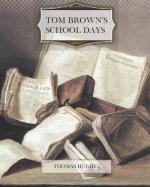“Hadn’t we better carry him to the sick-room?” suggests Diggs.
“Oh, I can walk now,” says Tom; and, supported by East and the housekeeper, goes to the sick-room. The boy who held his ground is soon amongst the rest, who are all in fear of their lives. “Did he peach?” “Does she know about it?”
“Not a word; he’s a stanch little fellow.” And pausing a moment, he adds, “I’m sick of this work; what brutes we’ve been!”
Meantime Tom is stretched on the sofa in the housekeeper’s room, with East by his side, while she gets wine and water and other restoratives.
“Are you much hurt, dear old boy?” whispers East.
“Only the back of my legs,” answers Tom. They are indeed badly scorched, and part of his trousers burnt through. But soon he is in bed with cold bandages. At first he feels broken, and thinks of writing home and getting taken away; and the verse of a hymn he had learned years ago sings through his head, and he goes to sleep, murmuring,—
“Where the wicked cease from troubling, And the weary are at rest.”
But after a sound night’s rest, the old boy-spirit comes back again. East comes in, reporting that the whole house is with him; and he forgets everything, except their old resolve never to be beaten by that bully Flashman.
Not a word could the housekeeper extract from either of them, and though the Doctor knew all that she knew that morning, he never knew any more.
I trust and believe that such scenes are not possible now at school, and that lotteries and betting-books have gone out; but I am writing of schools as they were in our time, and must give the evil with the good.
CHAPTER IX—A CHAPTER OF ACCIDENTS.
“Wherein I [speak]
of most disastrous chances,
Of moving accidents
by flood and field,
Of hair-breadth ’scapes.”—Shakespeare.
When Tom came back into school after a couple of days in the sick-room, he found matters much changed for the better, as East had led him to expect. Flashman’s brutality had disgusted most even of his intimate friends, and his cowardice had once more been made plain to the house; for Diggs had encountered him on the morning after the lottery, and after high words on both sides, had struck him, and the blow was not returned. However, Flashey was not unused to this sort of thing, and had lived through as awkward affairs before, and, as Diggs had said, fed and toadied himself back into favour again. Two or three of the boys who had helped to roast Tom came up and begged his pardon, and thanked him for not telling anything. Morgan sent for him, and was inclined to take the matter up warmly, but Tom begged him not to do it; to which he agreed, on Tom’s promising to come to him at once in future—a promise which, I regret to say, he didn’t keep. Tom kept Harkaway all to himself, and won the second prize in the lottery, some thirty shillings, which he and East contrived to spend in about three days in the purchase of pictures for their study, two new bats and a cricket-ball—all the best that could be got—and a supper of sausages, kidneys, and beef-steak pies to all the rebels. Light come, light go; they wouldn’t have been comfortable with money in their pockets in the middle of the half.




